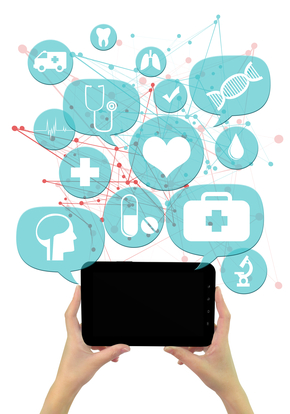As Americans Adopt Mobile Health Tools, Professionals Must Evaluate the Consequences

Mobile devices have become ubiquitous in modern American society. Although some psychologists worry that too much screen time can be bad for health, mobile devices can actually be a force used for good in the realm of healthy living.
Popular Self-monitoring Tools
According to a survey of U.S. consumers by Royal Philips Electronics, one in 10 Americans believe that Web-based health information has prevented them from dying or becoming severely incapacitated. For example, the WebMD app for Android has been downloaded more than 5 million times, suggesting that consumers rely on mobile devices to provide important health information. Similarly, patients with back pain may visit sites such as lsinewsroom.com on their smartphones to read about the latest research on spine problems to identify potential treatments. From simply visiting a mobile site to downloading apps, health is showing up on mobile phones.
An increasingly popular sector of mobile health tools are self-monitoring programs. A 2012 report by Pew Research indicates that 60 percent of U.S. adults track their dietary habits, exercise routines or weight. Furthermore, 33 percent track health indicators such as headaches, blood sugar levels, blood pressure, or sleep patterns. Although much of this tracking is done informally, use of apps or self-tracking monitors is increasingly common.
Benefits of Mobile Health Tools
Fostering a sense of efficacy. One of the key benefits of mobile health tools is fostering a sense of patient efficacy. Research has demonstrated that improving self-efficacy translates into changes in behavior and improved treatment outcomes, according to Euromedinfo.com. For example, a patient who monitors his blood pressure each day may notice spikes that coincide with major work deadlines. As a result, he may feel empowered to advocate for a more balanced workload or use other strategies to manage his stress during these times.
Increasing accuracy. Patient self-report is notoriously unreliable, making it a contributing factor to medical errors or misjudgments. For example, MedCoach is a popular app used to remind patients to take their medications. Improving medication compliance decreases risk of adverse outcomes and increases patient well-being.
Providing increased information to medical professionals. For medical professionals, more data is useful when helping a patient make informed health care decisions. Using devices that monitor vitals, track changes in mood or weight, or check other symptoms provides physicians with a wealth of clinically useful information. For example, use of a symptom checking device may help a psychiatrist notice that after beginning a new antidepressant medication, a patient experienced significant weight gain and an uptick in anxiety symptoms. Rather than relying on a patient’s retrospective report or “hunch” about a medication, the physician can make an informed decision about adjusting the dosage or medication class.
Drawbacks of Relying on Mobile Devices for Health
Although consumers are increasingly willing to try mobile devices to monitor health symptoms, these products have some drawbacks. One of the key areas of concern is that patients may become over-reliant on medical devices and avoid seeking treatment. By consulting symptom checker apps or other online medical advice, patients may overlook key patterns or symptoms that are indicators of serious health problems. The Philips survey suggested that 25 percent of respondents trust devices as much as a doctor, while 27 percent use home tools in lieu of consulting a physician.
To fully take advantage of the benefits of mobile health tools, health care professionals may advocate for the use of tracking devices in conjunction with appropriate visits to a medical facility. This combines the advantage of patient self-monitoring data with a physician’s expert knowledge, promoting the most advantageous health outcomes.
Links
Web-based health information – http://www.newscenter.philips.com/us_en/standard/news/press/2012/20121212_Philips_Survey_Health_Info_Tech.wpd#.Ur2dePRDvrf
lsinewsroom.com – http://www.lsinewsroom.com/
Pew Research – http://pewinternet.org/Reports/2013/Tracking-for-Health.aspx

